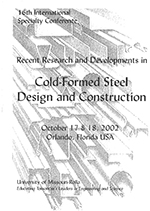Session Dates
17 Oct 2002
Abstract
Second-generation sheeting is widely used for cladding and roof construction. At interior supports, it is subjected to combined bending moment and concentrated load. Unfortunately, design rules for this loading are complicated and do not provide insight in the sheeting's failure behaviour. This means there is a need for a new, insight providing design rule. For first-generation sheeting, a similar problem did exist. The Technische Universiteit Eindhoven (TUE) carried out three research projects [Bakk92a,Vaes95a,Hofm00a] that provided insight in the first-generation sheeting behaviour and resulted in a new, insight providing design rule. The TUE now uses the strategy of these three research projects for a new project on second-generation sheeting [Kasp01a], with the final aim of a new design rule for second-generation sheeting. In this new project, experiments on commonly used (in the Netherlands) second-generation sheeting were carried out. Second-generation sheeting behaviour was compared with first-generation sheeting behaviour. For sheeting with only stiffeners in flange, load falls occur before ultimate load. Stiffeners in the web only result in load falls after the ultimate load. For an experiment with only stiffeners in the web, a finite element simulation was made. The simulation predicts the sheeting behaviour fairly well and indicates how a stiffener affects the sheeting behaviour.
Department(s)
Civil, Architectural and Environmental Engineering
Research Center/Lab(s)
Wei-Wen Yu Center for Cold-Formed Steel Structures
Meeting Name
16th International Specialty Conference on Cold-Formed Steel Structures
Publisher
University of Missouri--Rolla
Document Version
Final Version
Rights
© 2002 University of Missouri--Rolla, All rights reserved.
Document Type
Article - Conference proceedings
File Type
text
Language
English
Recommended Citation
Kaspers, M.; Snijder, H. H.; Bakker, Monique; and Hofmeyer, H., "Ultimate Failure Behaviour of Second-generation Sheeting Subjected to Combined Bending Moment and Concentrated Load" (2002). CCFSS Proceedings of International Specialty Conference on Cold-Formed Steel Structures (1971 - 2018). 7.
https://scholarsmine.mst.edu/isccss/16iccfss/16iccfss-session2/7
Ultimate Failure Behaviour of Second-generation Sheeting Subjected to Combined Bending Moment and Concentrated Load
Second-generation sheeting is widely used for cladding and roof construction. At interior supports, it is subjected to combined bending moment and concentrated load. Unfortunately, design rules for this loading are complicated and do not provide insight in the sheeting's failure behaviour. This means there is a need for a new, insight providing design rule. For first-generation sheeting, a similar problem did exist. The Technische Universiteit Eindhoven (TUE) carried out three research projects [Bakk92a,Vaes95a,Hofm00a] that provided insight in the first-generation sheeting behaviour and resulted in a new, insight providing design rule. The TUE now uses the strategy of these three research projects for a new project on second-generation sheeting [Kasp01a], with the final aim of a new design rule for second-generation sheeting. In this new project, experiments on commonly used (in the Netherlands) second-generation sheeting were carried out. Second-generation sheeting behaviour was compared with first-generation sheeting behaviour. For sheeting with only stiffeners in flange, load falls occur before ultimate load. Stiffeners in the web only result in load falls after the ultimate load. For an experiment with only stiffeners in the web, a finite element simulation was made. The simulation predicts the sheeting behaviour fairly well and indicates how a stiffener affects the sheeting behaviour.



